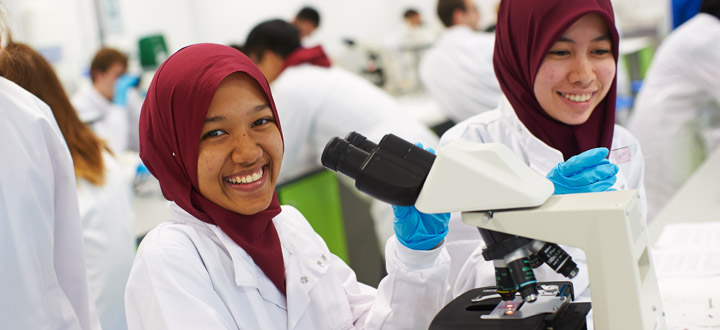Research targets smarter support for medical students
-
Research
- Health and Wellbeing
Posted on 8 May 2018
Research could enable medical schools to identify students most likely to need support during their studies.

Research shows a medical student's background can influence their support needs.
University is a stressful time for anyone so if this makes studying easier, particularly for those who have had to struggle a little more than others, then that’s a good thing.
Medical students are required to declare any issues that could impair their fitness to practice as a doctor, just before graduation. Research by our Department of Health Sciences shows that understanding the trends in different groups’ declarations could mean that support can be specifically aimed at students who need it most.
Dr Lewis Paton, who led the research, explained how valuable the findings could be. “Earlier studies in the United States had shown that students demonstrating ‘misbehaviour’ in medical school can predict further malpractice when that person is working as a doctor, so we wanted to know what might cause these issues in training.”
Standard practice is for students to complete a standard form comprising thirteen categories relating to health or conduct issues. Using this information the team was able to access anonymous data from the UK Medical Education Database which separated the participants into a range of demographics.
Lewis said: “We also had information on a student’s gender, parental background, school type and so on,” said Lewis. “We were essentially looking at whether those demographic variables predict these outcomes.”
Unexpected
While in many cases the study findings were not unexpected, there were some surprising results which highlighted a potentially worrying trend for medical education providers.
Dr Paton said: “Some results were straightforward, for example we found that males run into behavioural issues more than females and that women are more likely to report health issues than men.
“But some results were unexpected. We also found that students with non-professional parents were four times more likely to declare an experience of depression by the end of their medical training than those whose parents were from a professional background.”
Dr Paton sees similarities between this data and a study in the United States which showed that African-American medical students, an under-represented group in the US medical education system, show similar higher levels of reporting depression during their medical training.
Useful
And there could be a useful instruction for education providers to take from his research.
“Education providers may need to look at providing more support such as increased mental health awareness or mentoring systems, and place a particular emphasis on encouraging students from certain backgrounds to take part,” he says.
“There’s a push to train more medical students and for those going into the medical profession to be more representative of the wider population, so hopefully there’s going to be more students from a non-professional background going to medical school. University is a stressful time for anyone so if this makes studying easier, particularly for those who have had to struggle a little more than others, then that’s a good thing.”
This work was part funded by the National Institute for Health Research (NIHR) which was established by the Department of Health and Social Care. The NIHR funds high quality research to improve health, trains and supports health researchers. It provides world-class research facilities, involves patients and the public at all stages, and works with the life sciences industry and charities to benefit all. Find out more about the NIHR
The text of this article is licensed under a Creative Commons Licence. You're free to republish it, as long as you link back to this page and credit us.

Dr Lewis Paton
Research Title: Research Fellow
Dr Paton's research interests focus on how we can model data using both new and existing statistical approaches. His methodological interests include generalised linear models, imprecise probability, and Bayesian statistics.
Explore more research

A research project needed to spot trees on historic ordnance survey maps, so colleagues in computer science found a solution.

We’re using gaming technology to ensure prospective teachers are fully prepared for their careers.

A low cost, high-accuracy device, could play a large part in the NHS's 'virtual wards'.
